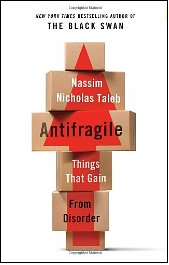That’s no typo in this post’s title. Antifragility is a thing, and today I’m discussing the concept as it applies to fictional stories.
 In his book Antifragile, Things That Gain From Disorder, Nassim Nicholas Taleb asks if there is an antonym of the word “fragile.” If there were such an adjective, he’d say it describes things that become stronger when stressed.
In his book Antifragile, Things That Gain From Disorder, Nassim Nicholas Taleb asks if there is an antonym of the word “fragile.” If there were such an adjective, he’d say it describes things that become stronger when stressed.
He doesn’t mean words like ‘robust,’ ‘tough,’ or ‘resilient.’ Those words describe things that sustain shocks without damage. He wants to describe things that improve their resistance to stress by being stressed. Lacking a ready word, he coined the term ‘antifragile.’
Can a story be antifragile? To answer that, we should consider the things that impose stresses on stories. These include criticism in negative reviews and mocking satire.
What would it mean for a story to become stronger? If it meant that the story became more widely read, more popular, with increased sales, then an antifragile story would be one that suffers negative reviews or even satire and yet its sales increase.
Are there any such stories? If I recall correctly, Nassim Taleb offered the more popular plays of William Shakespeare as examples. For four centuries, those plays have endured bad reviews and been mocked, but they are performed far more often and in more languages and formats than they were in Shakespeare’s time.
From an author’s point of view, antifragility seems like a wonderful property for a story to have, especially the increasing sales part, right? If you wanted to write an antifragile story, and perhaps lacked the skill of Shakespeare, how would you go about it? Are there tangible attributes of such stories? Is there a checklist to follow?
I hate to disappoint you, but there’s no checklist. Further, the only authors who really understand what it takes to make a story antifragile…well, they’re dead. That’s because stories don’t really demonstrate that property to the greatest extent while the author is alive.
Still, being me, I’ll take a crack at it, because I like a challenge. Here is my proposed checklist for making your stories antifragile:
- Create complex and compelling characters. They need to seem real, with strong emotions and motivations, with goals to attain, with difficult inner problems to surmount, and with bedeviling decisions to make.
- Appeal to every reader. That may be impossible to achieve in a single story, but in your body of work you should include characters of many types, in diverse settings. Include rich and poor, young and old, introvert and extrovert, city and country, etc.
- Explore the eternal truths about the human condition. You know many of these eternal truths—we’re born, we grow up, we have parents, we learn to relate to others and even fall in love, we have disagreements and conflicts with others, we become curious about the nature of our world, we deteriorate with age, and we die. When I say to ‘explore’ these truths, I don’t mean to write a philosophy book. Write a fictional story that entertains, but causes readers to ponder those deeper truths after reading it.
- Execute your story with style, flair, and creativity. Yeah, right. Simply do that. This one is hard to implement, but I’ll suggest some thoughts. Look for ways to turn a phrase well. Create a new word that English lacks but needs. Write in a manner that stands out, such that readers could identify your unique voice from a couple of paragraphs chosen randomly from your stories.
Okay, it’s not really a checklist where you mark off each item in turn: done, done, done. It’s more of a guideline with concepts to aim for. Who knows if it’s even accurate? After all, I’m not dead yet (as I write this), so I can’t possibly know.
Still, it’s intriguing to think that one day, readers may consider your stories to be antifragile, and when scholars trace it back, they’ll discover you learned how to do it from—
Poseidon’s Scribe
